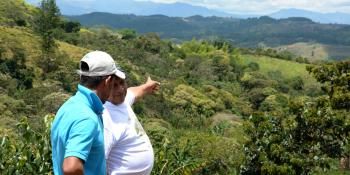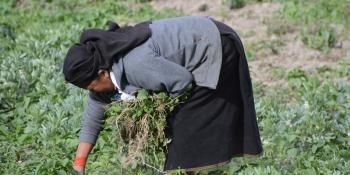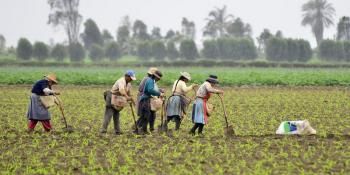Overcoming barriers in climate change policies in Latin America

From the perspective of public policy, climate change, agriculture, and food security are highly complex issues. Their importance for sustainable development makes them topics of interest and debate among actors who participate in or influence decision-making processes surrounding policies about these issues.
The diversity of actors that make up these processes, and the contexts in which they operate, create various complexities. These complexities go from external circumstances to internal difficulties, such as the negotiation of interests that allow these policies to implement. It is against this backdrop that efforts are being made to facilitate their navigation by identifying and recognizing the various obstacles to the implementation of climate policies related to agriculture and the rural sector.
One of these efforts is the international seminar on "Public Policies and Climate Change in Latin America: Progress and Prospects for Research," which brought together an interdisciplinary group of researchers from Argentina, Bolivia, Brazil, Colombia, Ecuador, Peru, Honduras and France to assess the knowledge about the bottlenecks in the implementation of climate policies that affect agriculture and the rural sector in Latin America.
Organized by the CGIAR Research Program on Climate Change, Agriculture and Food Security (CCAFS) and the Network on "Public Policy and Rural Development in Latin America" (PP-AL), with the support of the French regional cooperation program "ClimaT AmSud”, this meeting allowed the exploration of the barriers in the implementation of policies aimed at climate challenges in the rural communities of Latin America, through presentations of regional, national and local studies.
Climate policy barriers
The different studies revealed barriers of a technical, structural and conjunctural nature. Some of the most relevant issues and concerns during the sessions held at the seminar were:
- insufficient knowledge and technical capacity of different actors to make decisions and act urgently in the face of climate policy problems;
- problems in institutional response capacity in the face of recurrent and growing climate shocks;
- a lack of mobilization and conflicts of interest of political parties to implement ambitious policies; and
- a lack of coordination between policy instruments and actors to effectively translate national policies into local policies.
The event also confirmed a gap between the increasing number of climate change policy documents and the effective processes of public action dedicated to changing behaviors and decisions that affect the target populations. The need to broaden this kind of analysis to explore complexities that go beyond public policy and public action was highlighted during the seminar.
Routes for collaboration
As a result of the seminar, different routes for collaboration on a regional research agenda to investigate and solve current barriers emerged. First, a summary article was drafted on the barriers and limits to the implementation of climate policies in the region, which seeks to open up this analysis of the political dimension and the roles played by the stakeholders.
Second, a seminar was prepared to analyze in detail and systematize experiences, good practices and models to promote interaction between science and public policy in Latin American countries and territories. This seminar will aim to provide a state-of-the-art production and use of scientific research in public policy decision-making processes.
Finally, new research projects were planned, referring to the political-institutional dynamics identifying change drivers, the integration of traditional ecological knowledge in policies, the definition of indicators to monitor policies and their effects in terms of resilience and adaptive capacity, as well as on the generation of capacities for different actors.
Read more:
- Research project: Shaping equitable climate change policies for resilient food systems across Central America and the Caribbean
- News update: Honduras analyzes its public policies on climate change
- News update: Creating spaces for climate change policies in Guatemala
- News update: Creating climate change policies for rural development in Latin America



